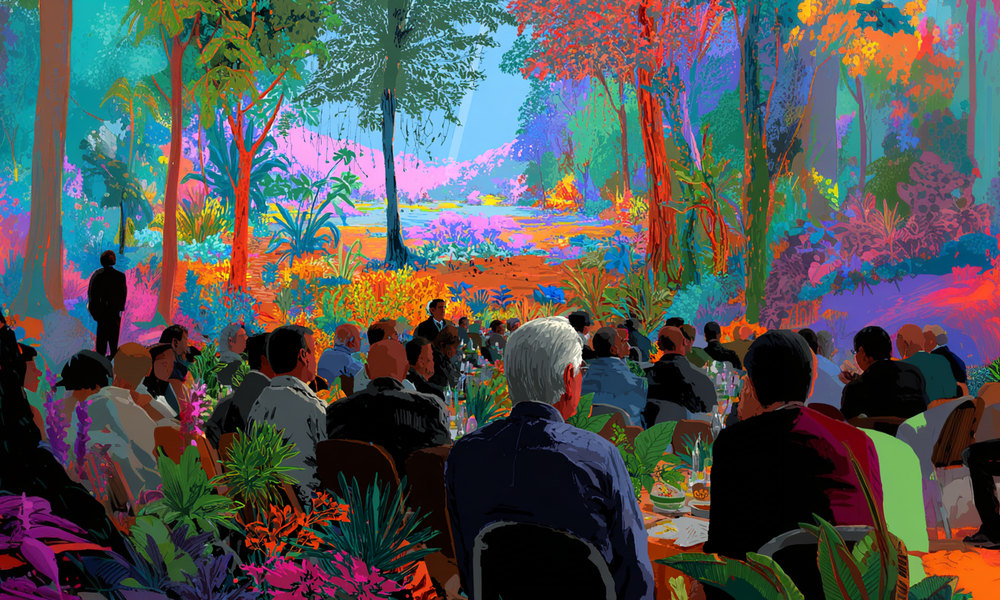THE question
11/05/2025
Are there reasons to believe in Brasil’s COP 30?
You’re probably planning to follow the COP with little hope left — and I get it. But from Belo Horizonte (BR), I’ve found three reasons to believe this one might just be different.
Thirty years. It has been thirty years since the first COP 1995 in Berlin. Thirty years since the United Nations first started gathering to address climate change. A key milestone in the form of an even number, which naturally raises a concern: how many more will it take? The question alone speaks volumes about the expectations once placed in these conferences, and perhaps now even more about the disappointments they have garnered.
Originally, these COPs were meant to foster a form of global governance in which every nation and civil society would assume its responsibilities and adopt rules deemed vital for the planet. But how are we to keep believing when the president of the world’s largest economy — whose first act in office was to withdraw from the Paris Agreement — once again voices, less than two months before COP30, his hostility toward that ambition.
While speaking at the UN on September 23rd, Donald Trump reiterated his position on climate change, describing it as “the greatest con job ever perpetrated on the world” and dismissing the idea of carbon footprint as “a fraud invented by people with malicious intent.”

And yet, this COP might not be just another COP. Being held in Brazil gives it at least three reasons to believe it could leave a lasting legacy.
1. A COP at the Amazon’s Gateway
Its location carries tremendous symbolism. By choosing Belém, the COP highlights the pivotal role of the Amazon in the climate crisis and enshrines the founding principle of multilateralism. Indeed, the rainforest spans nine countries, covering roughly 5.5 million square kilometers and housing just over 30 million inhabitants, including about 25 million in Brazil alone.
This is likely why Brazilian authorities resisted pressure to relocate at least part of COP 30 from Pará’s capital to other major cities such as Rio, São Paulo, or Brasília. The organization relies on local resources, including Belém’s few hotels capable of hosting an international audience, as well as the hospitality of locals who open their homes to visitors.
In addition, several cruise ships will dock in Belém’s port to accommodate foreign guests, an option that, understandably, has drawn strong criticism. One might even call it an example of frugal innovation.
2. Brazilians’engagement
The lively debate unfolding in Brazil over COP 30 proves that society does not shy away from the issue. True to Brazil’s highly polarized political life, COP 30 has its supporters and detractors.
The conference has faced criticism over organizational shortcomings, which could hinder the participation of traditional and Indigenous populations of the Amazon, sparking fears that it might become one of the most exclusive and chaotic COPs in history.
Brazil itself has also been criticized for gaps in its domestic climate governance, notably the mismatch between its diplomatic ambitions and the practical challenges faced in Belém and the Amazon region.
The Amazon, the planet’s green lung, sits at the heart of discussions with no shortage of contentious topics: intensive agriculture, mining, and widespread smuggling. Driven by the growing demand for clean technologies, the extraction of minerals essential to the energy transition has serious environmental consequences in Brazil — including deforestation and CO₂ emissions — and has long been overlooked in previous COPs.
After years of limited political will, President Lula’s government appears more determined. Public pressure is driving progress: at the UN General Assembly, Lula announced a one-billion-dollar investment in the Tropical Forest Forever Facility (TFFF), a commitment that sets a benchmark for the expanded BRICS bloc.
Yet, the Amazon remains defended as national territory, rather than as a global common.
Through my work with French-Brazilian professional networks, such as the French Foreign Trade Advisors (CCEF) in Brazil and the France-Brazil Chamber of Commerce, I’ve observed how climate and biodiversity concerns are increasingly shaping development strategies. New opportunities are emerging to build a different kind of economy, especially in Brazil, whose energy mix is remarkably sustainable and whose biodiversity holds immense potential for responsible development.
3. The Fight for Science and Education
Brazil is the world’s biggest WhatsApp user, making it fertile ground for climate misinformation. The spread of fake news poses a serious challenge to efforts aimed at improving climate education. Expanding access to higher education is essential for disseminating and validating scientific progress.
Civil society—including businesses and NGOs—is taking an active role, adopting responsible approaches showcased at COP 30. It’s up to us to play our part by guiding students and businesses toward these approaches.
At SKEMA and its Belo Horizonte campus, we are committed to developing new skills for a sustainable future. We’ll present a week-long program in the state of Amazonas, at the crossroads between the scientific and entrepreneurial worlds.
Our goal is to help people recognize opportunities to build an economy rooted in biodiversity—one that serves Indigenous communities and, by extension, society as a whole.
To dig a little deeper, I suggest you take a break — and listen to three podcasts I’ve handpicked for you.
Going further
Interested in this subject?
We recommend that you read this.

The Lord of the Rings: How to Turn Artificial Intelligence into a Weapon of Mass Creation?
Should We Follow Gollum’s Path — or Frodo’s?

